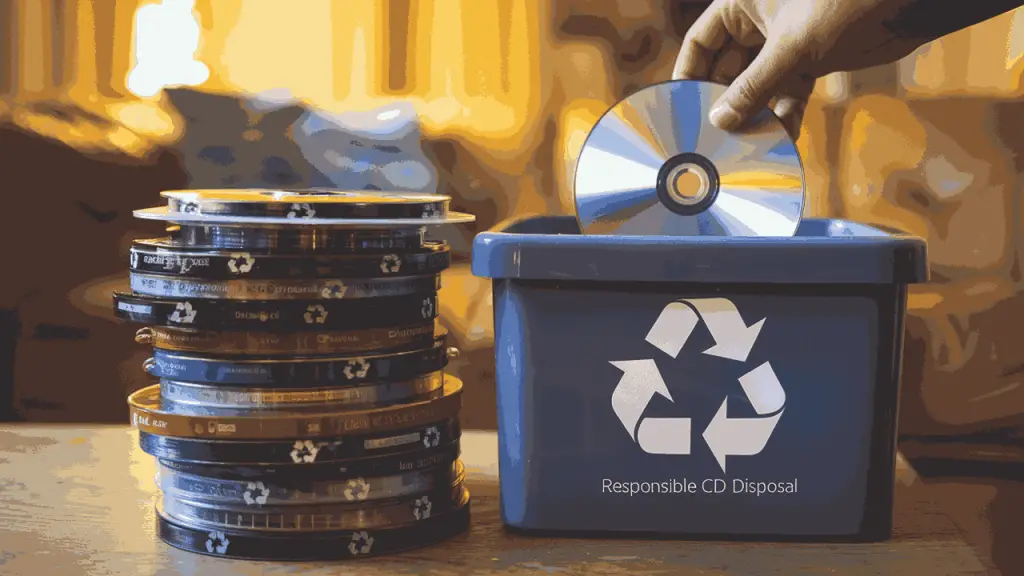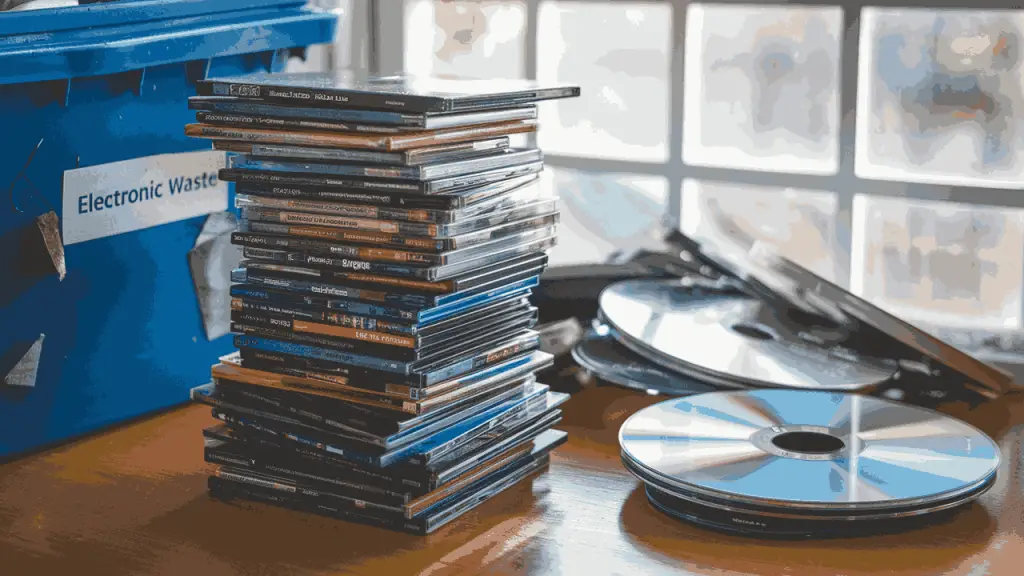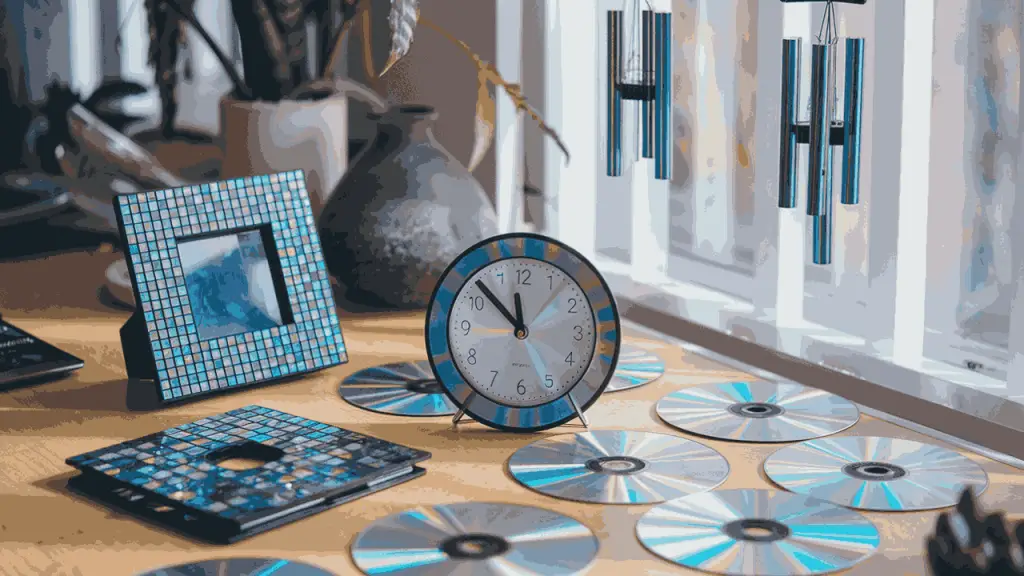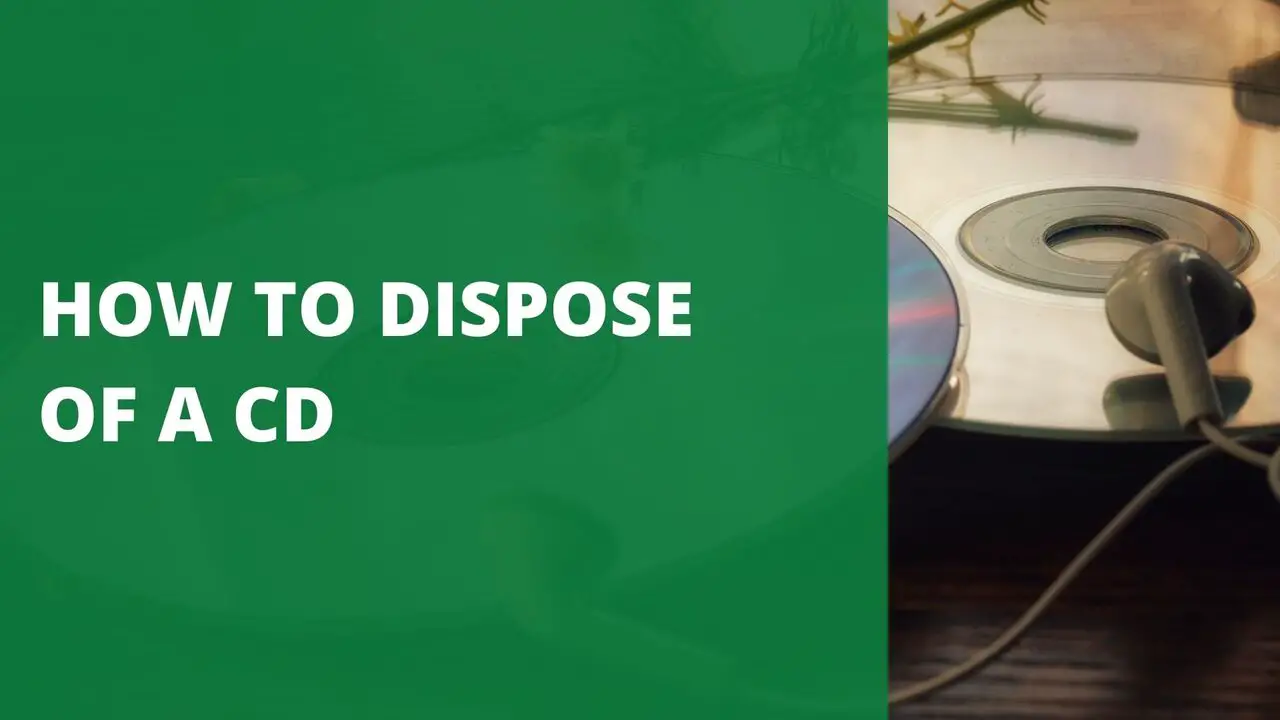Forget about letting those old CDs and DVDs collect dust in a drawer. They’re more than just clutter, just like that stack of unused office paper sitting in the corner. It’s a really bad idea to toss them in the regular trash, and it not only harms the environment but also wastes recyclable materials.
Instead, turn them into fun DIY projects such as shiny coasters, eye‑catching wall art, or even quirky garden markers or bring them to a recycling facility or program that knows exactly how to break them down safely. It’s a simple and perfect solution, feel‑good way to clear the clutter and give those compact discs a fresh start.

DVDs, CDs and Blu-ray discs
A. Give away, sell or donate
Before you consider disposing of your CDs, DVDs, Blu-ray discs, floppy disks, or cassette tapes, consider giving them a second life. It’s surprising to know how many people still value these physical media formats. Here are some donation location options for you to explore:
- Give away to friends or family
- Sell online through platforms like eBay or Facebook Marketplace
- Many local libraries, such as those in the Burbank Library system, accept donations of CDs, DVDs, and Blu-rays in good condition to expand their lending collections. Call your library to confirm their donation guidelines, as some may have specific requirements.
- Contribute to charity shops or thrift stores like Goodwill or the Salvation Army.
- Educational institutions and community hubs often need media for classrooms, after-school programs, or community events. For example, schools might use donated DVDs for movie nights or music CDs for art projects. Contact local schools or centers to see if they’re interested.
B. Recycle

It’s important to note that CDs, DVDs, and Blu-ray discs can’t be recycled through regular curbside recycling programs due to their composition. Here’s what you need to know:
- CDs and DVDs are made of polycarbonate plastic
- Blu-ray discs have an additional layer of material
- The reflective layer and labels can complicate the recycling process
To recycle these items properly, you’ll need to find specialized recycling options that can handle electronic hazardous waste (e-waste). Many of these places take more than just CDs and DVDs – think old computer monitors or laptops too. If you’ve got those lying around, check out our guides on how to dispose of a computer monitor and how to dispose of an old laptop for some handy tips.
For example, the Pennsylvania Resource Council (PRC) in Pittsburgh takes these items at weekly events for a small fee ($0.35 per pound as of 2019). Check with your local waste management authority or search Earth911’s recycling locator to find nearby options.
C. Curbside Pick-up and Drop-off Centers
While regular curbside recycling won’t accept your old unwanted discs, some communities offer special e-waste collection days or have dedicated drop-off centers like the Solid Waste District in Cuyahoga County, Ohio accepts CDs, DVDs, Blu-rays, and cases year-round at their Garfield Heights facility.
Here’s how you can take advantage of these services:
- Check with your local waste management authority or use Earth911’s locator.
- Look for e-waste collection events in your area
- Find nearby electronics recycling collection centers
| Service Type | Pros | Cons |
| Curbside Collection Pick-up | Convenient, no travel required | Limited availability, specific dates |
| Drop-off Centers | Accept a wide range of e-waste | May require travel, limited hours |
Remember to remove any personal data from your discs before recycling, especially if they contain sensitive information.D. Mail-in Programs
If local options are limited, mail-in recycling programs offer a convenient alternative. These programs allow you to send your old CDs, DVDs, and Blu-ray discs directly to recycling facilities. Here’s how they typically work:
- Request a recycling kit or label from the program
- Pack your discs securely
- Ship the package to the designated recycling center
Some popular mail-in programs include:
When choosing a mail-in program, consider factors such as cost, accepted materials, and the company's environmental certifications. Some programs may charge a small fee, while others offer free recycling for a limited number of items.By exploring these various common methods, you’re taking an important step towards responsible e-waste prevention management. In the next section, we’ll explore creative ways to reuse CDs, giving them new life beyond their original purpose.
Ways to Reuse: Up-Cycling CDS

A. Creative Repurposing Ideas
Consider these innovative ways to give CD’s a second life:
- DIY Ideas for Home Decor
- Create a mosaic wall art
- Make coasters
- Design a unique mirror frame
- Garden Decor
- Use as reflective bird deterrents
- Create shimmering wind chimes
- Craft Projects
- Make jewelry
- Create festive ornaments
- Design a CD clock
B. Functional Reuse Options
Your old CDs can still serve practical purposes before throwing them in the trash containers:
| Reuse Option | Description |
| Data Backup | Use writable CDs for important file storage |
| Scratch Guards | Protect furniture from scratches |
| Cable Organizers | Keep wires tidy and organized |
| Drink Coasters | Protect surfaces from water rings |
C. Educational Applications
- Create educational games for children
- Use as teaching aids in science classes
- Incorporate into art lessons for texture and reflection studies
Now that you’ve explored these creative reuse options, you’ll see your old CDs in a whole new light.
Conclusion
Disposing of CDs and DVDs the right way matters more than you might think. These discs might feel outdated, but you don’t have to just throw them away. Whether you upcycle them into creative projects, donate working discs and electronics, or drop them off at a local recycling center, there are plenty of eco‑friendly paths to choose.
If you’re unsure where to go, reach out to nearby charities or recycling facilities. They’ll help you figure out the best way to repurpose or recycle your old media. By taking these simple steps, you’ll clear out the clutter and do your part for a greener, more sustainable future.
FAQ’s:
1. May I deliver electronic items with a truck?
You can use a truck to deliver electronic items for recycling or donation. Many e-waste drop-off locations accept large quantities, making it convenient for you to transport multiple items at once. Check with your local recycling center or donation facility for their specific guidelines on truck deliveries and any potential fees.
2. Where may I donate working computers and other electronic items?
You can donate your working computers and electronics to various organizations, giving them a second life and helping those in need. Here are some options: Local schools or libraries, Nonprofit organizations, Community centers, Goodwill or Salvation Army

